Sarah Fine's Blog, page 2
June 3, 2013
Traumatizing Your Characters, Part 6: Intrusive Recollection
We've discussed a lot of aspects of trauma at this point! If you'd like to catch up, here you are:
Part 1: General factsPart 2: Types of tramaPart 3: Aspects of trauma that make it more or less likely to have lingering psychological effectsPart 4: Individual factors that make it more or less likely a person will develop PTSD after a trauma
Part 5 A and B: Developmental trauma (some thoughts on Nobody But Us by Kristin Halbrook) and an interview with Kristin herself
Are you all primed and ready now? Awesome. We'll start talking about symptoms. PTSD has a set of diagnostic criteria that I suggest you go read. There are three primary symptom clusters in PTSD:
Intrusive RecollectionAvoidance/NumbingHyperarousal
We're going to talk about each symptom cluster separately, and today we'll go over intrusive recollection. Here are the symptoms--you have to have at least one of them to "qualify" for a diagnosis of PTSD (from the DSM-IV-TR):Recurrent and intrusive distressing recollections of the event, including images, thoughts, or perceptions. Note: in young children, repetitive play may occur in which themes or aspects of the trauma are expressed.Recurrent distressing dreams of the event. Note: in children, there may be frightening dreams without recognizable contentActing or feeling as if the traumatic event were recurring (includes a sense of reliving the experience, illusions, hallucinations, and dissociative flashback episodes,including those that occur upon awakening or when intoxicated). Note: in children, trauma-specific reenactment may occur.Intense psychological distress at exposure to internal or external cues that symbolize or resemble an aspect of the traumatic event.In literary and movie portrayals of PTSD, this is the symptom cluster that gets the most attention. Lots of people primarily think of flashbacks when they talk about this type of symptom, but that's only one type (symptom #3).
Let me offer you a brief example from SANCTUM, in which Lela is in the fight of her life, and a memory hits her sideways and makes it impossible for her to stay in the moment:
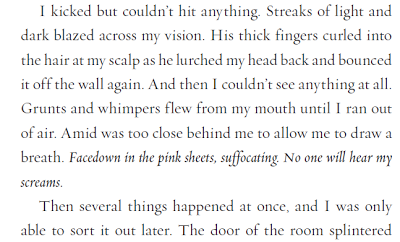
"Intrusive" is a term that basically means unbidden and interfering. These are ambush memories that strike when the person isn't *trying* to recall the event. It's incredibly upsetting, because it's like your mind is operating all on its own, jabbing you with these images and noises and sensations you'd really like to never experience again, thank you very much.
Nightmares are a common recollection symptom as well, but for adults, they would need to be associated with the trauma or memories of the trauma to be included as a symptom of intrusive recollection.
And finally, symptom #4 ... we've all heard the word "trigger", right? That's essentially what those "internal or external cues" are. Things that instantly remind the person of what happened to them, and sometimes result in a cascading physiological reaction--panic.
In my next post, we'll discuss triggers. But before we do that, if you're writing a character who's experiencing PTSD, what symptom(s) of intrusive recollection are you trying to portray? How are you showing the character's experience? Or, if you're not writing a character like this, but you've read books that do this well, tell us about them!
One more day to enter to win a copy of the excellent NOBODY BUT US by Kristin Halbrook! I'll announce the winner on Wednesday.
a Rafflecopter giveaway
Part 1: General factsPart 2: Types of tramaPart 3: Aspects of trauma that make it more or less likely to have lingering psychological effectsPart 4: Individual factors that make it more or less likely a person will develop PTSD after a trauma
Part 5 A and B: Developmental trauma (some thoughts on Nobody But Us by Kristin Halbrook) and an interview with Kristin herself
Are you all primed and ready now? Awesome. We'll start talking about symptoms. PTSD has a set of diagnostic criteria that I suggest you go read. There are three primary symptom clusters in PTSD:
Intrusive RecollectionAvoidance/NumbingHyperarousal
We're going to talk about each symptom cluster separately, and today we'll go over intrusive recollection. Here are the symptoms--you have to have at least one of them to "qualify" for a diagnosis of PTSD (from the DSM-IV-TR):Recurrent and intrusive distressing recollections of the event, including images, thoughts, or perceptions. Note: in young children, repetitive play may occur in which themes or aspects of the trauma are expressed.Recurrent distressing dreams of the event. Note: in children, there may be frightening dreams without recognizable contentActing or feeling as if the traumatic event were recurring (includes a sense of reliving the experience, illusions, hallucinations, and dissociative flashback episodes,including those that occur upon awakening or when intoxicated). Note: in children, trauma-specific reenactment may occur.Intense psychological distress at exposure to internal or external cues that symbolize or resemble an aspect of the traumatic event.In literary and movie portrayals of PTSD, this is the symptom cluster that gets the most attention. Lots of people primarily think of flashbacks when they talk about this type of symptom, but that's only one type (symptom #3).
Let me offer you a brief example from SANCTUM, in which Lela is in the fight of her life, and a memory hits her sideways and makes it impossible for her to stay in the moment:

"Intrusive" is a term that basically means unbidden and interfering. These are ambush memories that strike when the person isn't *trying* to recall the event. It's incredibly upsetting, because it's like your mind is operating all on its own, jabbing you with these images and noises and sensations you'd really like to never experience again, thank you very much.
Nightmares are a common recollection symptom as well, but for adults, they would need to be associated with the trauma or memories of the trauma to be included as a symptom of intrusive recollection.
And finally, symptom #4 ... we've all heard the word "trigger", right? That's essentially what those "internal or external cues" are. Things that instantly remind the person of what happened to them, and sometimes result in a cascading physiological reaction--panic.
In my next post, we'll discuss triggers. But before we do that, if you're writing a character who's experiencing PTSD, what symptom(s) of intrusive recollection are you trying to portray? How are you showing the character's experience? Or, if you're not writing a character like this, but you've read books that do this well, tell us about them!
One more day to enter to win a copy of the excellent NOBODY BUT US by Kristin Halbrook! I'll announce the winner on Wednesday.
a Rafflecopter giveaway
Published on June 03, 2013 03:00
May 31, 2013
Traumatizing Your Characters, Part 5(B): An interview with Kristin Halbrook, author of NOBODY BUT US, who did the thing properly.
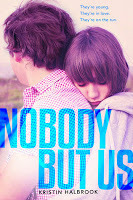 Today we have an interview with Kristin Halbrook, author of Nobody But Us, which I discussed in Wednesday's post. I sent Kristin a few questions about her book, and when I read her responses, all I could think was, "Okay then. That would explain why Nobody But Us was so well done." So, without further ado, here's Kristin (and please enter to win a copy of Nobody But Us at the bottom of the page!)
Today we have an interview with Kristin Halbrook, author of Nobody But Us, which I discussed in Wednesday's post. I sent Kristin a few questions about her book, and when I read her responses, all I could think was, "Okay then. That would explain why Nobody But Us was so well done." So, without further ado, here's Kristin (and please enter to win a copy of Nobody But Us at the bottom of the page!)Did you base the character of Will on a real-life person or a conglomeration of people you've known?
Will is definitely his own man, but as his character developed more and more, I did start to see some attributes of people I've known--people who have had tough childhoods or teen years--coming out in him. Digging into those similarities, I discovered that some common features of the lives of those I know and of Will are a lack of early guidance, a life missing steady and grounded adults to use as examples for what their lives should be like, a lack of meaningful connections, and difficulty managing emotions, expectations and goals.
One of the questions I started asking Will--and a question he asks himself--is how does he become a man (an adult, really) when there's never been anyone around to show him how to get from where he is to where and who he wants to be? So he flails as he tries to figure out how to shape his life. This person, the one who has dreams, rather than goals, and not a good sense of how to reach them, is someone I've known many times in my life. They're never "bad" people, and neither is Will. They're simply people floundering, trying to rise above their pasts and make something of themselves the best way they know how.
Did you do any research on how early trauma affects young people? Were there any particular facets of that you wanted to highlight in your characterization?
My research began with looking at some accounts of adults and older teens who had grown up in the foster care system and what their lives are like now. As you can imagine, there are a variety of experiences shared in these accounts, but they were a stepping stone to reading further about early trauma. I also read extensively and talked with a friend in the field of clinical psychology about personality disorders, including how they develop, whether or not they could be genetic, and how they manifest in a person's behavior.
In particular, I looked closely at depression, dissociation, hyper-arousal continuum, and post traumatic stress disorder. There are hints in the book that Will's mom may have suffered from severe depression or even bipolar disorder, which Will can't find out about for sure because he doesn't have contact with his mom. He questions whether he suffers from those, too. That is never resolved. However, his outbursts and inability to control his emotions, including anger and extreme protectiveness, are results seen in young people who cope using the hyper-arousal continuum (the "flight or fight" response) and in many sufferers of PTSD, which is something victims of child abuse can and certainly do develop.
How would you explain Will's character to someone not familiar with his past?
I would say that Will is a teen, with all the passions and high-strung emotions of everyday teens . . . multiplied by ten. I would say he is trying, really hard, but that his "life toolbox," the place where many people store acceptable learned social behaviors, is mostly empty. I would say that he is a victim of abuse and of a system that couldn't quite catch him when the cracks opened up and let him fall through. I would say that he wants to get beyond his past, that he wants to recover, feel whole, that he's trying, but that he's completely on his own in doing so. His life has taught him that there's no one who wants to help him and, as his story progresses, he feels that he may have gone too far, that maybe no one can help him. He clings to Zoe's love like it's his salvation, but unfortunately, she's broken, too, and not in a place to be the person who can help him.
Zoe is also a traumatized character, but your portrayal of the two of them is quite distinct. It really drives home the idea that all traumatic experiences are not the same, nor are the people who endure them. Can you talk a little about how you went about showing those differences?
Will and Zoe have coped with their abuses using techniques that are nearly polar opposites. One of the major differences in the way Zoe endures her trauma compared to Will is that Zoe turns inward to cope, rather than lashing out. Zoe is like a turtle, trying to build a shell defense that she can escape into anytime she feels threatened. Her mechanisms include social isolation, preferring to be anonymous in her small town and allowing only one person to be her friend, and dissociation. This is particularly seen in the moments she imagines herself somewhere else--in her yellow room--when she's being abused and in the way the memories of her mother's death are able to be warped by her dad, later to be recovered by Zoe.
I did feel it was important to show two distinct experiences with these characters. Because there isn't only one way to endure, to cope, to deal, to escape and, ultimately, hopefully, to find help and heal. Humans are complicated creatures with a variety of defense mechanisms and reactions at their disposals.
Wow, right? If you're researching a character who's experienced trauma, let us know how you've done that! And, have you ready Nobody But Us? Would you like to? Enter to win a copy below! And, I'll be back next week to go into depth about the symptoms of PTSD, with plenty of examples from YA books.
a Rafflecopter giveaway
Published on May 31, 2013 03:00
May 29, 2013
Traumatizing Your Characters, Part 5(A): Trauma that doesn't always look like "TRAUMA"
If you're catching up with this series, let me help:
Part 1: general information about trauma
Part 2: specific types of trauma
Part 3: aspects of traumatic events that make them more likely to cause PTSD symptoms
Part 4: things that make people/characters more vulnerable to developing PTSD after a trauma
Today we talk about something that not many people know about--developmental trauma. It's actually been a rather huge controversy in the field over the last decade, especially as the new DSM was being developed. If you want a great article that discusses this, here it is. Basically, the criteria for PTSD are not adequate for kids who have been neglected, whose early years are characterized by upheaval, chaos, inadequate physical and emotional caregiving, and sometimes outright abuse. The symptoms of PTSD that I'll describe in future posts are based on adults, and further based on the idea of trauma as an event or set of events, as opposed to a pervasive and lasting set of circumstances.
While "classic" trauma symptoms include intrusive recollection of the trauma, avoidance/numbing symptoms, and hyperarousal symptoms, what you often see in individuals who have endured chronic/developmental trauma are additional things like severely impaired emotion regulation; faulty perceptions of the self and others; drastically reduced sense of self-control and effectiveness; and disorganized, limited, or strangely intense and indiscriminate relationships with other people. These individuals often receive diagnoses of ADHD, attachment disorder, mood disorders (including bipolar disorder), and personality disorders (most especially borderline personality disorder for females and antisocial personality disorder for males).
We currently have no adequate way in our diagnostic system to understand the effects of developmental trauma. Treating this kind of trauma is complex, too, especially when the individual carries with him/her a boatload of diagnostic labels, meds, and past treatments that didn't address the core issues.
I see that misunderstanding and struggle in fiction as well:
Characters who have this kind of background and are often surprisingly ... fine. It's almost like the author gave them a past to make them more interesting, but doesn't show the lingering aftereffects that this kind of experience has. We get to be all awwwwww the poor thing and then swooooon the character is perfectly broken with no scars except some sadness to show for it. As writers, we must be thoughtful about that. It's tricky. The pull to do this is incredibly strong, especially because ...
When an author shows what the aftereffects of trauma really look like, readers have trouble sympathizing with the characters. I've seen numerous reviews of numerous books that say something like "I know this person has a terrible background, but I can't understand why s/he is so temperamental/out of control/sexually promiscuous/mistrusting and hostile, etc!" And I totally understand that. We have trouble sympathizing with actual people who've been traumatized, too, because their behavior can be difficult to understand and sometimes, harmful and hurtful. We want to be sympathetic, but certain behaviors make it really, really hard. I know this, because I witness it every day in my other job. You've probably seen or experienced it in your lives, too, from one side or the other.
So if you're going to write this kind of character, be aware of that. It takes some courage and conscientiousness to do it, because if you do it well, not everyone is going to sympathize. Instead of giving you a host of writing tips (I'll have some general suggestions at the end of this series), I'm going to suggest something if you're writing a character with this type of background: read Nobody But Us by Kristin Halbrook.
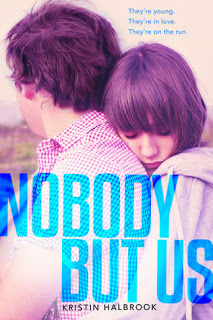
I read this book in the run-up to my trip to Portland, in part because I knew I was going to meet Kristin. I had no idea it was going to be so powerful. Nobody But Us is the story of Will and Zoe, each traumatized in different ways, trying to start a life together in pretty much the worst way possible. It is, in my opinion, an exquisitely crafted portrayal of the inner workings and interpersonal dynamics of these two troubled teenagers who are trying their absolute best to save each other and to be saved. It's gut-wrenching and tender and frightening and hopeful and heartbreaking, all at the same time. Not a light read, but a worthwhile one.
As I was reading Kristin's book, I found myself highlighting all these passages that were pitch perfect examples of how someone who'd endured developmental trauma might think and act. Will, the male main character, spent his early years being passed from caregiver to caregiver, sometimes experiencing horrific abuse, sometimes being severely neglected, sometimes being torn from places where he could have had a shot at getting what he needed. He's just "graduated" from being in state custody at the beginning of the book.
The key thing I want to highlight about Will, who has the best of intentions but the most nervous-making of behaviors, is that he doesn't "act traumatized" in the way someone unfamiliar with developmental trauma might expect. He probably doesn't meet strict criteria for PTSD. But ohhhhh, it's all there. He has incredible difficulty regulating and controlling his emotions, and particularly his anger, even when he's desperate to do exactly that. He has major lapses in judgment, serious impulse-control issues, and a history of impoverished attachments to others--but then, his attachment to Zoe is incomprehensibly strong and all-encompassing. That doesn't mean it's not real, but Will is a powerful machine with some wires that got attached in the wrong places. He's complex and undeniably flawed, but so sympathetic. He might be a fictional character, but he IS one very good example of what can happen to a person who's endured that kind of childhood.
Zoe, who has lived under the abusive hand of her father and suffered the traumatic loss of her mother, has experienced a somewhat different kind of trauma, and she shows it in a very different way from Will. The author will be here on Friday to talk about how she did that, as well as how she did her research for the characters and the story.
Because I think this book is so worthy, I'm giving away a copy! US RESIDENTS ONLY, please. And--come back on Friday for an interview with Kristin!
a Rafflecopter giveaway
Part 1: general information about trauma
Part 2: specific types of trauma
Part 3: aspects of traumatic events that make them more likely to cause PTSD symptoms
Part 4: things that make people/characters more vulnerable to developing PTSD after a trauma
Today we talk about something that not many people know about--developmental trauma. It's actually been a rather huge controversy in the field over the last decade, especially as the new DSM was being developed. If you want a great article that discusses this, here it is. Basically, the criteria for PTSD are not adequate for kids who have been neglected, whose early years are characterized by upheaval, chaos, inadequate physical and emotional caregiving, and sometimes outright abuse. The symptoms of PTSD that I'll describe in future posts are based on adults, and further based on the idea of trauma as an event or set of events, as opposed to a pervasive and lasting set of circumstances.
While "classic" trauma symptoms include intrusive recollection of the trauma, avoidance/numbing symptoms, and hyperarousal symptoms, what you often see in individuals who have endured chronic/developmental trauma are additional things like severely impaired emotion regulation; faulty perceptions of the self and others; drastically reduced sense of self-control and effectiveness; and disorganized, limited, or strangely intense and indiscriminate relationships with other people. These individuals often receive diagnoses of ADHD, attachment disorder, mood disorders (including bipolar disorder), and personality disorders (most especially borderline personality disorder for females and antisocial personality disorder for males).
We currently have no adequate way in our diagnostic system to understand the effects of developmental trauma. Treating this kind of trauma is complex, too, especially when the individual carries with him/her a boatload of diagnostic labels, meds, and past treatments that didn't address the core issues.
I see that misunderstanding and struggle in fiction as well:
Characters who have this kind of background and are often surprisingly ... fine. It's almost like the author gave them a past to make them more interesting, but doesn't show the lingering aftereffects that this kind of experience has. We get to be all awwwwww the poor thing and then swooooon the character is perfectly broken with no scars except some sadness to show for it. As writers, we must be thoughtful about that. It's tricky. The pull to do this is incredibly strong, especially because ...
When an author shows what the aftereffects of trauma really look like, readers have trouble sympathizing with the characters. I've seen numerous reviews of numerous books that say something like "I know this person has a terrible background, but I can't understand why s/he is so temperamental/out of control/sexually promiscuous/mistrusting and hostile, etc!" And I totally understand that. We have trouble sympathizing with actual people who've been traumatized, too, because their behavior can be difficult to understand and sometimes, harmful and hurtful. We want to be sympathetic, but certain behaviors make it really, really hard. I know this, because I witness it every day in my other job. You've probably seen or experienced it in your lives, too, from one side or the other.
So if you're going to write this kind of character, be aware of that. It takes some courage and conscientiousness to do it, because if you do it well, not everyone is going to sympathize. Instead of giving you a host of writing tips (I'll have some general suggestions at the end of this series), I'm going to suggest something if you're writing a character with this type of background: read Nobody But Us by Kristin Halbrook.

I read this book in the run-up to my trip to Portland, in part because I knew I was going to meet Kristin. I had no idea it was going to be so powerful. Nobody But Us is the story of Will and Zoe, each traumatized in different ways, trying to start a life together in pretty much the worst way possible. It is, in my opinion, an exquisitely crafted portrayal of the inner workings and interpersonal dynamics of these two troubled teenagers who are trying their absolute best to save each other and to be saved. It's gut-wrenching and tender and frightening and hopeful and heartbreaking, all at the same time. Not a light read, but a worthwhile one.
As I was reading Kristin's book, I found myself highlighting all these passages that were pitch perfect examples of how someone who'd endured developmental trauma might think and act. Will, the male main character, spent his early years being passed from caregiver to caregiver, sometimes experiencing horrific abuse, sometimes being severely neglected, sometimes being torn from places where he could have had a shot at getting what he needed. He's just "graduated" from being in state custody at the beginning of the book.
The key thing I want to highlight about Will, who has the best of intentions but the most nervous-making of behaviors, is that he doesn't "act traumatized" in the way someone unfamiliar with developmental trauma might expect. He probably doesn't meet strict criteria for PTSD. But ohhhhh, it's all there. He has incredible difficulty regulating and controlling his emotions, and particularly his anger, even when he's desperate to do exactly that. He has major lapses in judgment, serious impulse-control issues, and a history of impoverished attachments to others--but then, his attachment to Zoe is incomprehensibly strong and all-encompassing. That doesn't mean it's not real, but Will is a powerful machine with some wires that got attached in the wrong places. He's complex and undeniably flawed, but so sympathetic. He might be a fictional character, but he IS one very good example of what can happen to a person who's endured that kind of childhood.
Zoe, who has lived under the abusive hand of her father and suffered the traumatic loss of her mother, has experienced a somewhat different kind of trauma, and she shows it in a very different way from Will. The author will be here on Friday to talk about how she did that, as well as how she did her research for the characters and the story.
Because I think this book is so worthy, I'm giving away a copy! US RESIDENTS ONLY, please. And--come back on Friday for an interview with Kristin!
a Rafflecopter giveaway
Published on May 29, 2013 03:00
May 22, 2013
Traumatizing Your Characters, Part 4: How Vulnerable is Your Character?
We've talked generally about trauma, specific types of trauma, and factors that make events more likely to result in PTSD symptoms. Today we'll focus on individual factors that make a person more vulnerable to PTSD. If you're writing a character who's going to develop PTSD (or not), you'll want to think about some of these things!
Vulnerable people are vulnerable. As you might have guessed, individuals with pre-existing depression or anxiety or more likely to develop PTSD after a trauma.
Age matters. We now know that the most vulnerable period for trauma is birth to three years of age. THIS IS NOT BECAUSE OF MEMORIES. I'm not going to get into a debate about childhood amnesia here because it's a huge topic, but memories of trauma don't appear to be the relevant thing when it comes to early trauma. Instead, it's about our developing brains, and whether they're geared for survival or learning. And because of the nature of trauma in this population (usually the result of abuse or neglect), it can affect our synaptic connections and how our DNA is expressed (called epigenetic effects).
Here's an interesting and tricky thing about trauma in childhood/adolescence--often, the person sort of freezes in that place in terms of their emotional development, as the brain switches from a focus on learning/growth into survival mode. The person might be quite intellectually capable and typical, but in terms of understanding the self in relation to others, and with respect to processing emotional experience and regulating strong emotions, it's a completely different story. This is a crucial consideration in treatment, and it should be on the mind of anyone writing a character who experienced trauma in childhood.
 Trauma is cumulative. If a person has experienced a trauma in the past (and particularly if they've experienced lingering symptoms as a result), they are more vulnerable to developing PTSD if they endure another traumatic event. For example, soldiers are more likely to develop PTSD after deployment if they've experienced a childhood trauma when compared to fellow soldiers with no trauma history.
Trauma is cumulative. If a person has experienced a trauma in the past (and particularly if they've experienced lingering symptoms as a result), they are more vulnerable to developing PTSD if they endure another traumatic event. For example, soldiers are more likely to develop PTSD after deployment if they've experienced a childhood trauma when compared to fellow soldiers with no trauma history.
 Social support is CRUCIAL. There's actually a window of about 72 hours after trauma where providing social support to someone can reduce the likelihood that s/he will develop PTSD. A few interventions have been developed that do exactly that. But it's not just immediately post-trauma--imagine a girl disclosing to her parents that she's been raped. How her parents respond to that disclosure REALLY matters. There's some research that suggests that if social supports respond with anger--even toward the perpetrator--it might actually make things worse, because it confirms how damaging the event was, and the girl then has to process her parents' intense and dysregulated emotions on top of her own. So--how many people know about the trauma, and how they react, is really going to have an impact on how a character deals with what happened.
Social support is CRUCIAL. There's actually a window of about 72 hours after trauma where providing social support to someone can reduce the likelihood that s/he will develop PTSD. A few interventions have been developed that do exactly that. But it's not just immediately post-trauma--imagine a girl disclosing to her parents that she's been raped. How her parents respond to that disclosure REALLY matters. There's some research that suggests that if social supports respond with anger--even toward the perpetrator--it might actually make things worse, because it confirms how damaging the event was, and the girl then has to process her parents' intense and dysregulated emotions on top of her own. So--how many people know about the trauma, and how they react, is really going to have an impact on how a character deals with what happened.
Disruption makes it worse. This is actually a good way to think about the effects of lots of trauma--how disruptive is it to the person's life? Think about it--does the character get to go home and recover, or is home even there anymore? Can the character turn to a loved one, or is that person injured or dead or ... the perpetrator of the trauma? Does the character get to walk away on two legs, or is one of them gone? Does she get to go back to her school and her friends, or has she been placed with a foster family in a different school district? The more disrupted a person's life, the harder it is to recover from trauma.
Thoughts can be sneaky little buggers. It's not unusual for a trauma survivor to have some thoughts and feelings of guilt and shame. She might feel guilty for some small decision that put her or a loved one in the wrong place at the wrong time. He might blame himself for being in the situation in the first place. He might blame himself for not being stronger. She might feel ashamed and fear how people will think of her. Unfortunately, these enemies reside in our minds, where they fester like wounds if not challenged or treated.
If you'd like, tell us about your character, and why this person is going to be resilient in the face of trauma--or terribly vulnerable. Or, how about you analyze an example? Think of Katniss from The Hunger Games. Which of these factors was relevant to how she responded to what she goes through in that series?
I'll be back on Wednesday of next week, where the focus will be on developmental trauma. I'll do that by discussing Nobody But Us, a riveting and powerful book by Kristin Halbrook featuring a character who exemplifies someone who's experienced this type of trauma. Next Friday, Kristin herself will discuss how she researched the characters so she could write an accurate portrayal, and I hope you'll stop by and check it out, because I am telling you--she did it right. I'll be giving away a copy of Nobody But Us next week as well!
Vulnerable people are vulnerable. As you might have guessed, individuals with pre-existing depression or anxiety or more likely to develop PTSD after a trauma.
Age matters. We now know that the most vulnerable period for trauma is birth to three years of age. THIS IS NOT BECAUSE OF MEMORIES. I'm not going to get into a debate about childhood amnesia here because it's a huge topic, but memories of trauma don't appear to be the relevant thing when it comes to early trauma. Instead, it's about our developing brains, and whether they're geared for survival or learning. And because of the nature of trauma in this population (usually the result of abuse or neglect), it can affect our synaptic connections and how our DNA is expressed (called epigenetic effects).
Here's an interesting and tricky thing about trauma in childhood/adolescence--often, the person sort of freezes in that place in terms of their emotional development, as the brain switches from a focus on learning/growth into survival mode. The person might be quite intellectually capable and typical, but in terms of understanding the self in relation to others, and with respect to processing emotional experience and regulating strong emotions, it's a completely different story. This is a crucial consideration in treatment, and it should be on the mind of anyone writing a character who experienced trauma in childhood.
 Trauma is cumulative. If a person has experienced a trauma in the past (and particularly if they've experienced lingering symptoms as a result), they are more vulnerable to developing PTSD if they endure another traumatic event. For example, soldiers are more likely to develop PTSD after deployment if they've experienced a childhood trauma when compared to fellow soldiers with no trauma history.
Trauma is cumulative. If a person has experienced a trauma in the past (and particularly if they've experienced lingering symptoms as a result), they are more vulnerable to developing PTSD if they endure another traumatic event. For example, soldiers are more likely to develop PTSD after deployment if they've experienced a childhood trauma when compared to fellow soldiers with no trauma history. Social support is CRUCIAL. There's actually a window of about 72 hours after trauma where providing social support to someone can reduce the likelihood that s/he will develop PTSD. A few interventions have been developed that do exactly that. But it's not just immediately post-trauma--imagine a girl disclosing to her parents that she's been raped. How her parents respond to that disclosure REALLY matters. There's some research that suggests that if social supports respond with anger--even toward the perpetrator--it might actually make things worse, because it confirms how damaging the event was, and the girl then has to process her parents' intense and dysregulated emotions on top of her own. So--how many people know about the trauma, and how they react, is really going to have an impact on how a character deals with what happened.
Social support is CRUCIAL. There's actually a window of about 72 hours after trauma where providing social support to someone can reduce the likelihood that s/he will develop PTSD. A few interventions have been developed that do exactly that. But it's not just immediately post-trauma--imagine a girl disclosing to her parents that she's been raped. How her parents respond to that disclosure REALLY matters. There's some research that suggests that if social supports respond with anger--even toward the perpetrator--it might actually make things worse, because it confirms how damaging the event was, and the girl then has to process her parents' intense and dysregulated emotions on top of her own. So--how many people know about the trauma, and how they react, is really going to have an impact on how a character deals with what happened.Disruption makes it worse. This is actually a good way to think about the effects of lots of trauma--how disruptive is it to the person's life? Think about it--does the character get to go home and recover, or is home even there anymore? Can the character turn to a loved one, or is that person injured or dead or ... the perpetrator of the trauma? Does the character get to walk away on two legs, or is one of them gone? Does she get to go back to her school and her friends, or has she been placed with a foster family in a different school district? The more disrupted a person's life, the harder it is to recover from trauma.
Thoughts can be sneaky little buggers. It's not unusual for a trauma survivor to have some thoughts and feelings of guilt and shame. She might feel guilty for some small decision that put her or a loved one in the wrong place at the wrong time. He might blame himself for being in the situation in the first place. He might blame himself for not being stronger. She might feel ashamed and fear how people will think of her. Unfortunately, these enemies reside in our minds, where they fester like wounds if not challenged or treated.
If you'd like, tell us about your character, and why this person is going to be resilient in the face of trauma--or terribly vulnerable. Or, how about you analyze an example? Think of Katniss from The Hunger Games. Which of these factors was relevant to how she responded to what she goes through in that series?
I'll be back on Wednesday of next week, where the focus will be on developmental trauma. I'll do that by discussing Nobody But Us, a riveting and powerful book by Kristin Halbrook featuring a character who exemplifies someone who's experienced this type of trauma. Next Friday, Kristin herself will discuss how she researched the characters so she could write an accurate portrayal, and I hope you'll stop by and check it out, because I am telling you--she did it right. I'll be giving away a copy of Nobody But Us next week as well!
Published on May 22, 2013 03:00
May 20, 2013
Traumatizing Your Characters, Part 3: Factors That Determine "Severity" of the Trauma
Welcome back! If you're just coming upon this post, the first two parts of this series are:
Part 1: general information about trauma
Part 2: types of trauma and examples of each
Today I'd like to discuss factors that make trauma worse or ... better (er ... relatively speaking).
But first, I want to stop here and acknowledge that some of you have been through traumatic events in your lives. Some of you are dealing with the aftereffects every day and every moment. Although these posts are in no way meant to be taken as medical or psychological advice, I just want to put it out there that some things I post might be triggering, and if that happens to you, please talk to someone about it. We'll go over factors that make characters (and people) more vulnerable in the next post, but social supports are KEY in recovering from and coping with trauma, so please seek that support if you need it. If you don't already have someone in your life who gives you that, there are several national hotlines of various types. It doesn't mean you have to talk about things before you're ready. It just means you might need someone to understand that things are hard sometimes, and no one should be alone.
Okay.
Lots of factors determine how likely it is that a person will experience lingering negative effects.*
Proximity. There's a continuum. The closer you are, the harder it is.
Personal victimàloved one/friendàWitnessàSaw on televisionàHeard about it
Here's an example: We ALL went through the recent bombings at the Boston Marathon (which is actually why I'm not going to post a picture to remind you of it). Most of us were nowhere near the actual event, but we saw it on TV and on Twitter and pretty much anywhere we looked--it was nearly inescapable. Horrific images, emotional narratives ... but the people who were THERE smelled it, and felt it against their skin, and heard it ringing in their ears. Some of them witnessed it. Some of them saw their friends or family members hurt. Some of them were hurt.
People, and especially children, can develop PTSD symptoms after repeated viewing of traumatic images. That was proven after 9/11, when some children in Europe developed symptoms after watching all the television coverage (KEEP THE CHILDREN AWAY FROM THE TV DURING THESE EVENTS PLEASE I BEG YOU THE MEDIA SHOWS ZERO RESTRAINT THESE DAYS). However, the "distance" from the event means less risk overall.
Other factors that determine severity:Interpersonal trauma--like a physical or sexual assault--is more effecting (in general) than trauma caused by something like a natural disaster or a car accident. Trauma at the hands of an intimate partner or family member increases risk for PTSD.As mentioned in the last post, chronic trauma is far more complicated to treat than single event trauma, and generally takes longer to recover from because of the pervasive nature of chronic trauma. Again, we'll devote an entire post to chronic trauma, particularly when it occurs in childhood. How invasive the trauma is also affects risk for PTSD. You can experience sexual trauma if someone flashes you, but it's (obviously, I think) harder to recover from a more invasive sexual trauma, such as one that involved penetration.If the trauma resulted in lasting injuries, it might increase risk for developing symptoms of PTSD. Lasting injuries can act as reminders, and sometimes triggers, of what the individual has gone through.
If you're writing about a character who's experienced a traumatic event, think about these factors. Identify how close they were, who was responsible (if anyone), how intimately linked the perpetrator was to your character, how long the trauma lasted, how invasive it was, and whether it left lingering physical scars.
Then spend some time thinking about what the character experienced during the event. Here's where you put on your WRITERPANTS. What did your character see, feel, smell, and hear? Be specific. Be detailed. This is what will make your story more authentic and your character's reaction more interesting. It will also help you when we reach the post where we discuss TRIGGERS.
*When I say something's "better" or "worse" or use qualitative words like that, I'm speaking very narrowly. What I mean is that something is more or less likely to result in long-term PTSD symptoms. I am not in any way dismissing any person's experience of a specific event or series of events.
Part 1: general information about trauma
Part 2: types of trauma and examples of each
Today I'd like to discuss factors that make trauma worse or ... better (er ... relatively speaking).
But first, I want to stop here and acknowledge that some of you have been through traumatic events in your lives. Some of you are dealing with the aftereffects every day and every moment. Although these posts are in no way meant to be taken as medical or psychological advice, I just want to put it out there that some things I post might be triggering, and if that happens to you, please talk to someone about it. We'll go over factors that make characters (and people) more vulnerable in the next post, but social supports are KEY in recovering from and coping with trauma, so please seek that support if you need it. If you don't already have someone in your life who gives you that, there are several national hotlines of various types. It doesn't mean you have to talk about things before you're ready. It just means you might need someone to understand that things are hard sometimes, and no one should be alone.
Okay.
Lots of factors determine how likely it is that a person will experience lingering negative effects.*
Proximity. There's a continuum. The closer you are, the harder it is.
Personal victimàloved one/friendàWitnessàSaw on televisionàHeard about it
Here's an example: We ALL went through the recent bombings at the Boston Marathon (which is actually why I'm not going to post a picture to remind you of it). Most of us were nowhere near the actual event, but we saw it on TV and on Twitter and pretty much anywhere we looked--it was nearly inescapable. Horrific images, emotional narratives ... but the people who were THERE smelled it, and felt it against their skin, and heard it ringing in their ears. Some of them witnessed it. Some of them saw their friends or family members hurt. Some of them were hurt.
People, and especially children, can develop PTSD symptoms after repeated viewing of traumatic images. That was proven after 9/11, when some children in Europe developed symptoms after watching all the television coverage (KEEP THE CHILDREN AWAY FROM THE TV DURING THESE EVENTS PLEASE I BEG YOU THE MEDIA SHOWS ZERO RESTRAINT THESE DAYS). However, the "distance" from the event means less risk overall.
Other factors that determine severity:Interpersonal trauma--like a physical or sexual assault--is more effecting (in general) than trauma caused by something like a natural disaster or a car accident. Trauma at the hands of an intimate partner or family member increases risk for PTSD.As mentioned in the last post, chronic trauma is far more complicated to treat than single event trauma, and generally takes longer to recover from because of the pervasive nature of chronic trauma. Again, we'll devote an entire post to chronic trauma, particularly when it occurs in childhood. How invasive the trauma is also affects risk for PTSD. You can experience sexual trauma if someone flashes you, but it's (obviously, I think) harder to recover from a more invasive sexual trauma, such as one that involved penetration.If the trauma resulted in lasting injuries, it might increase risk for developing symptoms of PTSD. Lasting injuries can act as reminders, and sometimes triggers, of what the individual has gone through.
If you're writing about a character who's experienced a traumatic event, think about these factors. Identify how close they were, who was responsible (if anyone), how intimately linked the perpetrator was to your character, how long the trauma lasted, how invasive it was, and whether it left lingering physical scars.
Then spend some time thinking about what the character experienced during the event. Here's where you put on your WRITERPANTS. What did your character see, feel, smell, and hear? Be specific. Be detailed. This is what will make your story more authentic and your character's reaction more interesting. It will also help you when we reach the post where we discuss TRIGGERS.
*When I say something's "better" or "worse" or use qualitative words like that, I'm speaking very narrowly. What I mean is that something is more or less likely to result in long-term PTSD symptoms. I am not in any way dismissing any person's experience of a specific event or series of events.
Published on May 20, 2013 03:00
May 17, 2013
Traumatizing Your Characters, Part 2: Types of Trauma
Now that we've established that most people will experience some sort of traumatic event(s) in their lives, and that a huge number of novels focus on trauma and its aftermath, let's discuss different types of trauma!
Trauma isn't ONE THING. It's sometimes hard to define, but here's SAMHSA's definition (lots of resources on that website, by the way--if you're going to traumatize a character, do your research!):
Single event:

car accidentphysical injury or accidentnatural disasterterrorismphysical or sexual assault
We'll talk about treatment in a later post, but professionals agree that single event trauma is often "simpler" to treat than other kinds of trauma, because the individual can focus on grieving and integrating one event. That doesn't mean this type of trauma is no big deal--it can be crippling. But man, are there some extremely effective treatments that work particularly well for individuals who've experienced it.
Books that deal with single incident trauma include Hate List by Jennifer Brown, Speak by Laurie Halse Anderson, and Willow by Julia Hoban. I would say that the majority of YA books dealing with trauma that I've read involve single event trauma.
Episodic:
domestic violencephysical and sexual abusecombat

With this type of trauma, there are periods of respite in between, and sometimes the surrounding environment isn't utterly toxic, but when things explode, they have a "snowball" or cumulative effect. The traumatic events aren't isolated--they wear a person down.
Books that deal with episodic trauma include The Things a Brother Knows by Dana Reinhardt and The Hunger Games series by Suzanne Collins (Catching Fire is where the author really begins to show the aftereffects of trauma, but she also deepens the trauma with additional traumatic events). Lela, the main character in Sanctum, has also experienced episodic trauma, though it could be argued that her background involves significant developmental trauma as well (see below).
Chronic:
refugee/forced displacement/warzonechild neglect and deprivation
Chronic trauma, and particularly early and ongoing child neglect and deprivation, is much more complicated to treat because of the frequency of negative events and the pervasive badness of the environment. Developmental trauma, sometimes referred to as "complex trauma," is also harder to diagnose, because sometimes there is no single event that could be identified as traumatic. Rather, sometimes the entire environment is the issue! This type of trauma gets a post all to itself. As a child psychologist, I think about, talk about, and deal with this type of trauma (in varying degrees of severity) A LOT.
Books that deal with chronic trauma include Living Dead Girl by Elizabeth Scott and Nobody But Us by Kristin Halbrook.
If you're writing about trauma, feel free to share the type of trauma your character has experienced, and how you're thinking about his/her reaction to it. Also, please feel to recommend excellent books that deal with different types of trauma in an authentic manner!
On Monday, we'll move on to a discussion of factors that make traumatic events more likely to cause PTSD symptoms in those who experience them.
Trauma isn't ONE THING. It's sometimes hard to define, but here's SAMHSA's definition (lots of resources on that website, by the way--if you're going to traumatize a character, do your research!):
Individual trauma results from an event, series of events, or set of circumstances that is experienced by an individual as physically or emotionally harmful or threatening and that has lasting adverse effects on the individual's functioning and physical, social, emotional, or spiritual well-being.You see here that you need an event that a person experiences in a certain way, but that also has lasting effects. That's the core of it, but this can take so many different shapes!
Single event:

car accidentphysical injury or accidentnatural disasterterrorismphysical or sexual assault
We'll talk about treatment in a later post, but professionals agree that single event trauma is often "simpler" to treat than other kinds of trauma, because the individual can focus on grieving and integrating one event. That doesn't mean this type of trauma is no big deal--it can be crippling. But man, are there some extremely effective treatments that work particularly well for individuals who've experienced it.
Books that deal with single incident trauma include Hate List by Jennifer Brown, Speak by Laurie Halse Anderson, and Willow by Julia Hoban. I would say that the majority of YA books dealing with trauma that I've read involve single event trauma.
Episodic:
domestic violencephysical and sexual abusecombat

With this type of trauma, there are periods of respite in between, and sometimes the surrounding environment isn't utterly toxic, but when things explode, they have a "snowball" or cumulative effect. The traumatic events aren't isolated--they wear a person down.
Books that deal with episodic trauma include The Things a Brother Knows by Dana Reinhardt and The Hunger Games series by Suzanne Collins (Catching Fire is where the author really begins to show the aftereffects of trauma, but she also deepens the trauma with additional traumatic events). Lela, the main character in Sanctum, has also experienced episodic trauma, though it could be argued that her background involves significant developmental trauma as well (see below).
Chronic:
refugee/forced displacement/warzonechild neglect and deprivation
Chronic trauma, and particularly early and ongoing child neglect and deprivation, is much more complicated to treat because of the frequency of negative events and the pervasive badness of the environment. Developmental trauma, sometimes referred to as "complex trauma," is also harder to diagnose, because sometimes there is no single event that could be identified as traumatic. Rather, sometimes the entire environment is the issue! This type of trauma gets a post all to itself. As a child psychologist, I think about, talk about, and deal with this type of trauma (in varying degrees of severity) A LOT.
Books that deal with chronic trauma include Living Dead Girl by Elizabeth Scott and Nobody But Us by Kristin Halbrook.
If you're writing about trauma, feel free to share the type of trauma your character has experienced, and how you're thinking about his/her reaction to it. Also, please feel to recommend excellent books that deal with different types of trauma in an authentic manner!
On Monday, we'll move on to a discussion of factors that make traumatic events more likely to cause PTSD symptoms in those who experience them.
Published on May 17, 2013 03:00
May 15, 2013
Traumatizing Your Characters, Part 1: Generalities
Well, hello.
A few weeks ago, I attended the Missouri Writers Guild annual conference. I met a bunch of really enthusiastic, talented, and insightful writers and had an absolute blast. I also got to hang out with my incredible agent, which is a rare treat. Have I mentioned that I love her? I do. She deserves much credit for keeping me on the rails writing-wise ... which is not an easy task.
Anyway, one of the things I did while I was at the MWG conference was teach a master class called "The Ins and Outs of Traumatizing Your Characters." It was a ton of fun, because the people who attended were so full of input and feedback and questions and ideas--man, I love when I get to do things like that.
I've decided to share some of the information here on the blog. Over the next several posts, I'm going to give you:
some general info on traumadiscuss different types of trauma and how that impacts people's (and characters') reactionsidentify some factors that exacerbate and buffer trauma reactionsdiscuss each type of symptom in the PTSD diagnosistalk a little about treatmentoffer some general writing tipsHow does that sound? Shall we get started?
The reason I chose to offer a master class on trauma is that it's prime fiction material. So many novels deal with traumatizing events or how characters cope with the aftermath of trauma. It's riveting. Authors manage it in MANY different ways.
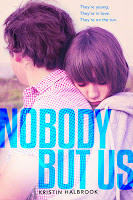 Nobody But Us by Kristin Halbrook is a heartbreaking story of two traumatized characters trying to find their way together. This book will be featured in my post about developmental trauma--including a brief interview with the author herself!
Nobody But Us by Kristin Halbrook is a heartbreaking story of two traumatized characters trying to find their way together. This book will be featured in my post about developmental trauma--including a brief interview with the author herself!
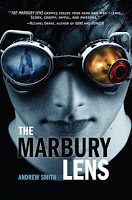 It could be argued that The Marbury Lens by Andrew Smith is one giant trauma reaction experienced by an already vulnerable character, but there's no "telling" here--it's all "show", which leaves you to figure it out for yourself.
It could be argued that The Marbury Lens by Andrew Smith is one giant trauma reaction experienced by an already vulnerable character, but there's no "telling" here--it's all "show", which leaves you to figure it out for yourself.
 The Hunger Games series by Suzanne Collins depicts the trauma reactions and ongoing traumatization of several of its main characters--in a dystopian setting.
The Hunger Games series by Suzanne Collins depicts the trauma reactions and ongoing traumatization of several of its main characters--in a dystopian setting.
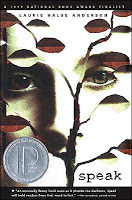 Speak by Laurie Halse Anderson is a beautifully done and realistic narrative of recovery from the trauma of rape. Trauma in fiction is relevant and resonant when done well. Here's why:
Speak by Laurie Halse Anderson is a beautifully done and realistic narrative of recovery from the trauma of rape. Trauma in fiction is relevant and resonant when done well. Here's why:
25-40% of youth will experience at least one potentially traumatizing event by age 16 Up to 60% of the US population is exposed to at least one traumatic event in their lifetimesPTSD affects more than TEN MILLION American children and adults--lifetime PTSD prevalence is 8% in the US.Women are twice as likely to develop PTSD. That may be due in part to men not being as willing to disclose for reasons having to do with our cultural and social roles and expectations, but the increased risk for women is also likely due to the fact that women are more likely to experience intimate/interpersonal trauma--we'll discuss why this is relevant in the next post!Lifetime prevalence might be 8%, but in military populations, it’s 14-15% ... for obvious reasons, I think.One thing you might notice from the above statistics--most people exposed to a traumatic event won’t develop PTSD or need treatment. We'll talk about why that is a few posts hence.
SO! Those are a few generalities. Are you writing characters going through trauma or dealing with its aftermath? What questions do you have? I've planned several posts for this series, but I may extend it to specific questions if folks are interested.
A few weeks ago, I attended the Missouri Writers Guild annual conference. I met a bunch of really enthusiastic, talented, and insightful writers and had an absolute blast. I also got to hang out with my incredible agent, which is a rare treat. Have I mentioned that I love her? I do. She deserves much credit for keeping me on the rails writing-wise ... which is not an easy task.
Anyway, one of the things I did while I was at the MWG conference was teach a master class called "The Ins and Outs of Traumatizing Your Characters." It was a ton of fun, because the people who attended were so full of input and feedback and questions and ideas--man, I love when I get to do things like that.
I've decided to share some of the information here on the blog. Over the next several posts, I'm going to give you:
some general info on traumadiscuss different types of trauma and how that impacts people's (and characters') reactionsidentify some factors that exacerbate and buffer trauma reactionsdiscuss each type of symptom in the PTSD diagnosistalk a little about treatmentoffer some general writing tipsHow does that sound? Shall we get started?
The reason I chose to offer a master class on trauma is that it's prime fiction material. So many novels deal with traumatizing events or how characters cope with the aftermath of trauma. It's riveting. Authors manage it in MANY different ways.
 Nobody But Us by Kristin Halbrook is a heartbreaking story of two traumatized characters trying to find their way together. This book will be featured in my post about developmental trauma--including a brief interview with the author herself!
Nobody But Us by Kristin Halbrook is a heartbreaking story of two traumatized characters trying to find their way together. This book will be featured in my post about developmental trauma--including a brief interview with the author herself! It could be argued that The Marbury Lens by Andrew Smith is one giant trauma reaction experienced by an already vulnerable character, but there's no "telling" here--it's all "show", which leaves you to figure it out for yourself.
It could be argued that The Marbury Lens by Andrew Smith is one giant trauma reaction experienced by an already vulnerable character, but there's no "telling" here--it's all "show", which leaves you to figure it out for yourself.  The Hunger Games series by Suzanne Collins depicts the trauma reactions and ongoing traumatization of several of its main characters--in a dystopian setting.
The Hunger Games series by Suzanne Collins depicts the trauma reactions and ongoing traumatization of several of its main characters--in a dystopian setting.  Speak by Laurie Halse Anderson is a beautifully done and realistic narrative of recovery from the trauma of rape. Trauma in fiction is relevant and resonant when done well. Here's why:
Speak by Laurie Halse Anderson is a beautifully done and realistic narrative of recovery from the trauma of rape. Trauma in fiction is relevant and resonant when done well. Here's why:25-40% of youth will experience at least one potentially traumatizing event by age 16 Up to 60% of the US population is exposed to at least one traumatic event in their lifetimesPTSD affects more than TEN MILLION American children and adults--lifetime PTSD prevalence is 8% in the US.Women are twice as likely to develop PTSD. That may be due in part to men not being as willing to disclose for reasons having to do with our cultural and social roles and expectations, but the increased risk for women is also likely due to the fact that women are more likely to experience intimate/interpersonal trauma--we'll discuss why this is relevant in the next post!Lifetime prevalence might be 8%, but in military populations, it’s 14-15% ... for obvious reasons, I think.One thing you might notice from the above statistics--most people exposed to a traumatic event won’t develop PTSD or need treatment. We'll talk about why that is a few posts hence.
SO! Those are a few generalities. Are you writing characters going through trauma or dealing with its aftermath? What questions do you have? I've planned several posts for this series, but I may extend it to specific questions if folks are interested.
Published on May 15, 2013 03:00
April 24, 2013
All the Things.
It's been a looooong time since I posted. It's amazing to me how quickly the months have passed. At this point, I honestly don't know how often I'll post, because so much is going on ... however, I think I'll plan a few series based on presentations I'll be doing at the Missouri Writers Guild conference at the end of this week!
I have many updates!
First: I've been so grateful and pleased with the way Sanctum has been received, and I'm excited (okay, and terrified) about the upcoming publication of book two, which is called:
FRACTURED
Some people have already expressed their apprehension about the direction of the story based on the title, which tells me the title is ... doing its job. Fractured will be published on 10/29/13 (which also happens to be my birthday). It is available for pre-order NOW . If you pre-order the Kindle edition, you will receive a free short story entitled Captive , which is from Malachi's perspective.
If that's not enough Malachi for you, his journal entries post three times a week right here, along with other news about the series.
And then: News about SCAN ... Putnam has decided to move the publication date from fall 2013 to May 2014. I'm happy about this change for a number of reasons (not the least of which is that having 2 books come out in fall 2013 might have made my head explode), and Walter J and I are super-excited about the book. More on that in the fall, I think. If you want to add it to your to-read shelf on Goodreads, it's right here.
And then: well, I guess there are so many things brewing on so many fronts that I could babble on about them, but it would be sorta premature. The publishing world is so funny--what's on my mind most right now is preparation for things you won't be seeing until next year sometime! Like Factory Ghost, which will be coming out next summer. It's like living in the future--it makes now rather hazy, unfortunately.
And ... that's all. Except that I'll be back in May with some posts about TRAUMA of all types, and some posts developmental psychology in YA fiction, and perhaps prizes of some type. Or cookies. I haven't decided.
How are you all doing? What have I missed? Have you published something? Are you querying? Have you gotten an agent or a book deal? Are you writing something you're excited about? Are you growing out your hair or taking up golf or moving to Bali? TELL ME.
I have many updates!
First: I've been so grateful and pleased with the way Sanctum has been received, and I'm excited (okay, and terrified) about the upcoming publication of book two, which is called:
FRACTURED
Some people have already expressed their apprehension about the direction of the story based on the title, which tells me the title is ... doing its job. Fractured will be published on 10/29/13 (which also happens to be my birthday). It is available for pre-order NOW . If you pre-order the Kindle edition, you will receive a free short story entitled Captive , which is from Malachi's perspective.
If that's not enough Malachi for you, his journal entries post three times a week right here, along with other news about the series.
And then: News about SCAN ... Putnam has decided to move the publication date from fall 2013 to May 2014. I'm happy about this change for a number of reasons (not the least of which is that having 2 books come out in fall 2013 might have made my head explode), and Walter J and I are super-excited about the book. More on that in the fall, I think. If you want to add it to your to-read shelf on Goodreads, it's right here.
And then: well, I guess there are so many things brewing on so many fronts that I could babble on about them, but it would be sorta premature. The publishing world is so funny--what's on my mind most right now is preparation for things you won't be seeing until next year sometime! Like Factory Ghost, which will be coming out next summer. It's like living in the future--it makes now rather hazy, unfortunately.
And ... that's all. Except that I'll be back in May with some posts about TRAUMA of all types, and some posts developmental psychology in YA fiction, and perhaps prizes of some type. Or cookies. I haven't decided.
How are you all doing? What have I missed? Have you published something? Are you querying? Have you gotten an agent or a book deal? Are you writing something you're excited about? Are you growing out your hair or taking up golf or moving to Bali? TELL ME.
Published on April 24, 2013 03:00
February 4, 2013
Books Change Lives at The Kindness Project
 I'm posting today at The Kindness Project about Books Change Lives, and I hope you'll go check it out! If you have children's books, parenting books, or young adult books that you could bear to part with, this might be a good way to do it!
I'm posting today at The Kindness Project about Books Change Lives, and I hope you'll go check it out! If you have children's books, parenting books, or young adult books that you could bear to part with, this might be a good way to do it!
Published on February 04, 2013 03:53
January 21, 2013
A thank you to those who have read and reviewed SANCTUM
I'm still toiling hard to meet my deadlines, so blogging is the thing that has been moved to the back burner, I'm afraid. But! Over the weekend, Sanctum reached a lovely milestone that I'd like to celebrate by thanking the people who made it happen.
As of this exact moment, Sanctum has well over 300 reviews on Amazon. That's wild, isn't it? I have to say--I didn't expect that. But the past two weeks saw Sanctum rise as high as #13 in the Kindle Store, so many more people have taken a chance on my little book. I'm grateful to everyone who has, and especially those who have taken the time to review it on retail sites.
So, here's a quick and easy giveaway (you don't have to have read or reviewed Sanctum to participate):
a Rafflecopter giveaway
As of this exact moment, Sanctum has well over 300 reviews on Amazon. That's wild, isn't it? I have to say--I didn't expect that. But the past two weeks saw Sanctum rise as high as #13 in the Kindle Store, so many more people have taken a chance on my little book. I'm grateful to everyone who has, and especially those who have taken the time to review it on retail sites.
So, here's a quick and easy giveaway (you don't have to have read or reviewed Sanctum to participate):
a Rafflecopter giveaway
Published on January 21, 2013 03:54



